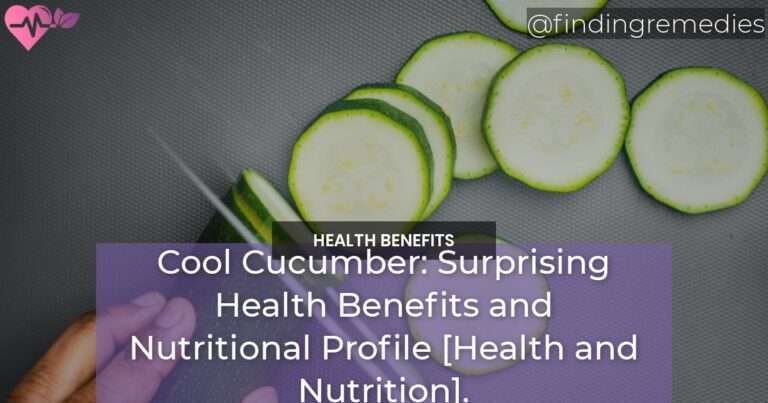When it comes to healthy eating, cucumbers are a perfect choice due to their low-calorie content, high nutritional value, and numerous health benefits. Cucumber is a tropical or subtropical vegetable that belongs to the same family as pumpkins, melons, and squash. It is an excellent source of vitamins, minerals, and antioxidants that can promote overall health and well-being.
This article provides a comprehensive guide to the health benefits of cucumber, including its nutritional profile, natural compounds, and various uses.
Table of Contents
Introduction
Cucumber has been widely used as a refreshing snack and salad ingredient due to its low-calorie content and high water content. It is also a rich source of vitamins and minerals such as vitamin K, vitamin C, potassium, and magnesium. Incorporating cucumber into your diet can help manage weight, improve digestion, and promote hydration. Cucumber is also a versatile ingredient that can be used in a variety of dishes, from smoothies to sandwiches.
Nutrition Profile of Cucumber
Cucumber is a low-calorie vegetable that contains only 16 calories per 100 grams. It is rich in nutrients and provides an excellent source of vitamins and minerals. Here is a summary of the nutritional profile of cucumber:
- Macronutrients: Cucumber contains carbohydrates, fiber, and protein.
- Micronutrients: Cucumber is rich in vitamins such as vitamin K and vitamin C, and minerals such as potassium, magnesium, and manganese.
- Comparison with other vegetables: Cucumber has a higher water content and fewer calories than most other vegetables, making it an ideal choice for weight management.
Natural Compounds in Cucumber
Cucumber contains several natural compounds that contribute to its health benefits. These compounds include antioxidants and phytochemicals that have anti-inflammatory properties. Some of the natural compounds found in cucumber are:
- Phytochemicals: Cucumber contains phytochemicals such as cucurbitacins and lignans that have anti-inflammatory effects.
- Antioxidants: Cucumber contains antioxidants such as vitamin C, beta-carotene, and flavonoids that protect cells against oxidative stress.
- Comparison with different varieties: Different varieties of cucumber contain varying levels of phytochemicals, with some having higher levels of antioxidants and anti-inflammatory compounds.
Health Benefits of Cucumber
Cucumber has numerous health benefits that can promote overall well-being. These benefits include:
- Effect on oxidative stress and inflammation: Cucumber contains antioxidants and anti-inflammatory compounds that can help reduce oxidative stress and inflammation in the body.
- Cucumber’s role in improving heart health: Cucumber contains potassium, a mineral that can regulate blood pressure and improve heart health.
- Anti-cancer properties of cucumber and its compounds: Cucumber contains compounds such as cucurbitacins that have been shown to have anti-cancer effects.
- Effect on blood sugar levels: Cucumber contains fiber and water, which can help regulate blood sugar levels.
Effects of Cooking and Proper Storage
Cooking and storage can affect the nutrient content of cucumber. Here are some tips for preserving the nutrient content of cucumber:
- Impact of cooking on nutritional value: Cooking cucumber can reduce its nutrient content. It is best to eat cucumber raw or lightly cooked.
- Tips for proper storage: Cucumber should be stored in a cool, dry place to prevent spoilage. It is also best to consume it within a few days of purchase to ensure maximum freshness.
Risk Factors and Disadvantages
While cucumbers are generally safe to consume, there are some potential risks associated with their consumption. These risks include:
- Potential risks associated with consuming cucumbers: Cucumbers can cause allergic reactions in some people. They can also be contaminated with bacteria or pesticides.
- Impact of pesticides on cucumber and how to mitigate the risk: Cucumber is one of the most heavily sprayed crops with pesticides. To reduce the risk of pesticide exposure, it is best to buy organic cucumbers or wash conventionally grown cucumbers thoroughly before consumption.
Healing Diseases with Cucumber
Cucumber has been shown to have several health benefits that can promote healing and reduce the risk of chronic diseases. These benefits include:
- Cucumber’s role in reducing the risk of chronic diseases: Cucumber contains antioxidants and anti-inflammatory compounds that can help reduce the risk of chronic diseases such as heart disease and cancer.
- Effect of cucumber on skin health: Cucumber contains vitamin C and other compounds that can improve skin health.
- Cucumber in the treatment of liver toxicity and hyperuricemia: Cucumber has been shown to have detoxifying effects and can help reduce liver toxicity and hyperuricemia.
Varieties and Types of Cucumber
Cucumber comes in a variety of types and varieties, each with its own nutritional profile and health benefits. Some of the most common types of cucumber include:
- English cucumber: English cucumber is long and thin and has a sweeter taste than other varieties. It is rich in water and low in calories.
- Pickling cucumber: Pickling cucumber is shorter and thicker than other varieties and is commonly used for pickling.
- Persian cucumber: Persian cucumber is small and seedless and has a mild flavor.
Conclusion
Cucumber is a nutrient-dense vegetable that can provide numerous health benefits. It is rich in vitamins, minerals, and antioxidants that can promote overall health and well-being. Incorporating cucumber into your diet can help manage weight, improve digestion, and promote hydration. Cucumber is also a versatile ingredient that can be used in a variety of dishes, from smoothies to sandwiches.
Resources
- 1. Effect of cucumber (Cucumis sativus) juice on serum uric acid levels in hyperuricemic rats. (2012)
- 2. Antioxidant properties of cucumber extract and its protective role against DNA damage and oxidative stress in rats. (2013)
- 3. Anti-inflammatory and anti-arthritic activities of cucumbers (Cucumis sativus L.) fruit extract in rats. (2019)

